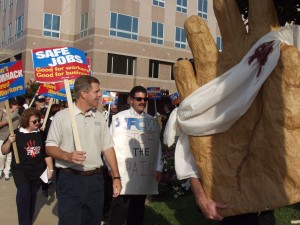 On March 25, 1911, a fire spread through the cramped floors of the Triangle Shirtwaist Factory in New York City. When the workers—mostly young female immigrants—tried to escape, they encountered locked doors and broken fire escapes. Rather than be burned alive, the workers began jumping out of windows and fell to their deaths on the street below as bystanders watched in horror.
On March 25, 1911, a fire spread through the cramped floors of the Triangle Shirtwaist Factory in New York City. When the workers—mostly young female immigrants—tried to escape, they encountered locked doors and broken fire escapes. Rather than be burned alive, the workers began jumping out of windows and fell to their deaths on the street below as bystanders watched in horror.
While decades of struggle by workers and their unions have resulted in significant improvements in working conditions, too many workers here in the U.S. and around the world continue to be killed on the job, or suffer from injuries, sickness or diseases in their places of work.
According to the Bureau of Labor Statistics, over 4,000 workers in the U.S. lost their lives on the job in 2012. Just last year, our sisters and brothers in Bangladesh were told to report to work in a building that had severe structural cracks and lost their lives when the factory collapsed, and here in the U.S., 14 workers lost their lives when a fertilizer plant that had been cited for safety violations exploded in in Texas. Six years ago, managers at the Imperial Sugar Company in Port Wentworth, Georgia, tolerated dirty and dangerous worksite conditions, and 14 workers without a collective voice died in a massive fire and explosion. And 23 years ago, 25 poultry workers at the Imperial Foods plant in Hamlet, North Carolina, were locked inside by their bosses and died in a horrible fire. Like the Triangle Shirtwaist Factory workers, they had no voice on the job to demand safety improvements.
Workers everywhere deserve a safe place to work, and those corporations that exploit workers for profit and put them in danger must be held accountable. Today, on the 103rd anniversary of the Triangle Shirtwaist Factory fire, we take to heart the words of activist Mother Jones to “pray for the dead and fight like hell for the living” by reaffirming our dedication to supporting workers here in the U.S. and around the world who are struggling to protect their basic rights – including safe jobs, workplace fairness and collective bargaining.
